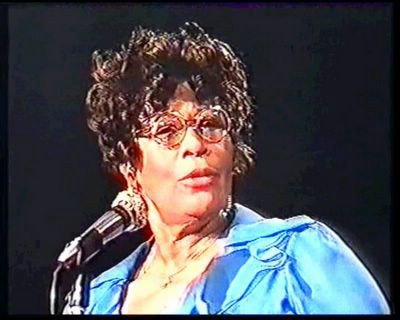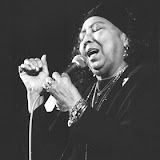"Twelve years ago, jazz vocalist Ruth Price put her piano in a Los Angeles photographer's studio and presented a jazz concert. Today, she runs The Jazz Bakery, one of the most prestigious jazz clubs in the United States. The Bakery features a wide range of jazz, 'from Legends to Latin.' A concert-only venue (no noisy restaurant service), the club's natural wood stage and ceiling offer exceptional acoustics. In addition to the usual headliners, you might hear Uri Caine performing classical music, or a trio from Poland or Japan. And Ruth has succeeded by running the club as a non-profit organization. Recently, I had the pleasure of interviewing her.
The Jazz Bakery is a non-profit jazz club. Why did you choose to go with a non-profit business model rather than the more traditional for-profit club?
Because I had never been in business, and the idea horrified me.
So with a non-profit I had a board that could help me open, and I could turn to them with questions. It just seemed like the right thing to do at the time. It's been that way always, ever since we started almost 12 years ago.
And it's called the Jazz Bakery because you're "
Friday, November 18, 2005
Wednesday, November 16, 2005
Wednesday, November 02, 2005
Skitch Henderson, dead at 87
Conductor Skitch Henderson Dies at Age 87
Associated Press, November 2, 2005, 7:13 AM EST
NEW HAVEN, Conn. -- Skitch Henderson, the Grammy-winning conductor who lent his musical expertise to Frank Sinatra and Bing Crosby before founding the New York Pops and becoming the first "Tonight Show" bandleader, died Tuesday. He was 87.
Henderson died at his home in New Milford of natural causes, said Barbara Burnside, spokeswoman for New Milford Hospital.
Born in England, Lyle Russell Cedric Henderson moved to the United States in the 1930s, eking out a living as a pianist, playing vaudeville and movie music in Minnesota and Montana roadhouses.
He got his big break in 1937, when he filled in for a sick pianist touring with Judy Garland and Mickey Rooney. When the tour wrapped up in Chicago, he used the original pianist's ticket and went to Hollywood.
There he joined the music department at MGM and played piano for Bob Hope's "The Pepsodent Show." His friendship with Hope put him in touch with other stars of the day, including Crosby, who became a mentor to Henderson.
He studied with the noted composer Arnold Schoenberg, and Henderson's talented ear brought him renown from some of the era's most successful musicians.
"I could sketch out a score in different keys, a new way each time," Henderson said earlier this year.
That quicksilver ability earned him the nickname "the sketch kid," which Crosby urged him to adapt to "Skitch." It stuck.
During World War II, Henderson flew for both the Royal Air Force and the United States Army Air Corps. At his estate in New Milford, which he shared with his wife, Ruth, Henderson kept a collection of aviation memorabilia. Even at 87, he had said he hoped to fly the Atlantic once more.
After the war, Henderson toured as Sinatra's musical director and lived what he called a "gypsy lifestyle," touring the country with various bands. It was Sinatra's phone call that lured Henderson to New York.
"Frank said, 'I'm moving the "Lucky Strike Show" to New York. Get rid of those gypsies and get back here where you belong,'" Henderson recalled in 1985.
He served as musical director for the "Lucky Strike" radio show and "The Philco Hour" with Crosby. And when NBC moved to television, the studio brought Henderson along as musical director.
In 1954, NBC pegged him as the bandleader for Steve Allen's "Tonight Show," which brought Henderson into the nation's living rooms every night. Even as the hosts changed from Allen to Jack Paar to Johnny Carson, Henderson was a constant.
He founded the New York Pops in 1983, using popular tunes to make orchestral music exciting.
"People come to hear music that's accessible to them -- old songs that are powerful and don't go away," he said.
In 1975, Henderson was sentenced to six months in prison and a $10,000 fine for filing false income tax statements. He was convicted of wrongly reporting that he donated musical scores and arrangements worth $350,000 to the University of Wisconsin in 1969. His defense lawyer blamed the tax violations on bad advice from an accountant.
Even in his late 80s, Henderson maintained a tireless work schedule as music director for the Pops, where he regularly served as conductor. He also was a frequent guest conductor at a number of orchestras around the world.
"I watch the public like a hawk. If I see boredom, I worry," Henderson said. "You can tell by the applause: There's perfunctory applause, there's light applause, and then there's real applause. When it's right, applause sounds like vanilla ice cream with chocolate sauce."
Associated Press, November 2, 2005, 7:13 AM EST
NEW HAVEN, Conn. -- Skitch Henderson, the Grammy-winning conductor who lent his musical expertise to Frank Sinatra and Bing Crosby before founding the New York Pops and becoming the first "Tonight Show" bandleader, died Tuesday. He was 87.
Henderson died at his home in New Milford of natural causes, said Barbara Burnside, spokeswoman for New Milford Hospital.
Born in England, Lyle Russell Cedric Henderson moved to the United States in the 1930s, eking out a living as a pianist, playing vaudeville and movie music in Minnesota and Montana roadhouses.
He got his big break in 1937, when he filled in for a sick pianist touring with Judy Garland and Mickey Rooney. When the tour wrapped up in Chicago, he used the original pianist's ticket and went to Hollywood.
There he joined the music department at MGM and played piano for Bob Hope's "The Pepsodent Show." His friendship with Hope put him in touch with other stars of the day, including Crosby, who became a mentor to Henderson.
He studied with the noted composer Arnold Schoenberg, and Henderson's talented ear brought him renown from some of the era's most successful musicians.
"I could sketch out a score in different keys, a new way each time," Henderson said earlier this year.
That quicksilver ability earned him the nickname "the sketch kid," which Crosby urged him to adapt to "Skitch." It stuck.
During World War II, Henderson flew for both the Royal Air Force and the United States Army Air Corps. At his estate in New Milford, which he shared with his wife, Ruth, Henderson kept a collection of aviation memorabilia. Even at 87, he had said he hoped to fly the Atlantic once more.
After the war, Henderson toured as Sinatra's musical director and lived what he called a "gypsy lifestyle," touring the country with various bands. It was Sinatra's phone call that lured Henderson to New York.
"Frank said, 'I'm moving the "Lucky Strike Show" to New York. Get rid of those gypsies and get back here where you belong,'" Henderson recalled in 1985.
He served as musical director for the "Lucky Strike" radio show and "The Philco Hour" with Crosby. And when NBC moved to television, the studio brought Henderson along as musical director.
In 1954, NBC pegged him as the bandleader for Steve Allen's "Tonight Show," which brought Henderson into the nation's living rooms every night. Even as the hosts changed from Allen to Jack Paar to Johnny Carson, Henderson was a constant.
He founded the New York Pops in 1983, using popular tunes to make orchestral music exciting.
"People come to hear music that's accessible to them -- old songs that are powerful and don't go away," he said.
In 1975, Henderson was sentenced to six months in prison and a $10,000 fine for filing false income tax statements. He was convicted of wrongly reporting that he donated musical scores and arrangements worth $350,000 to the University of Wisconsin in 1969. His defense lawyer blamed the tax violations on bad advice from an accountant.
Even in his late 80s, Henderson maintained a tireless work schedule as music director for the Pops, where he regularly served as conductor. He also was a frequent guest conductor at a number of orchestras around the world.
"I watch the public like a hawk. If I see boredom, I worry," Henderson said. "You can tell by the applause: There's perfunctory applause, there's light applause, and then there's real applause. When it's right, applause sounds like vanilla ice cream with chocolate sauce."
Subscribe to:
Comments (Atom)






